
Product test
Apple AirPods Pro: the double review
by Livia Gamper

Which earphones have better noise cancelling - Sony's WF-1000XM3 or Apple's AirPods Pro? And what makes good noise cancelling? With the help of experts, we measured both earphones - and came up with some interesting results.
A blog post on medium.com caught my attention. Philippe Niquille of Swiss company Rocket Science claims to have discovered the "secret ingredient" in Apple's AirPods Pro was discovered. I read the article with interest, but to be honest, I don't fully understand what was written.
At the end of 2019, my colleague Livia Gamper and I visited Rocket Science. Speakers, circuit boards, soldering irons and duct tape. We tinkered with something different on every desk. A coffee machine from a renowned manufacturer stands on a test set-up with several microphones. Before optimisation, the vibrations of the household appliance are measured.
The audio specialists in Zurich are experts in noise cancelling. This doesn't just mean noise cancelling headphones: they earn their money with orders from well-known companies that want to make their products quieter or are looking for a different sound for their products. For example, coffee machines, hoovers or other household appliances. Rocket Science's customers also include architects who design low-vibration buildings. Or concert organisers who want to optimise the acoustics.
Rocket Science works with counter-sound, just like noise-cancelling headphones do. The biologists, physicists, mathematicians and software experts in the team take a pragmatic approach. They don't just write this in their corporate philosophy, you notice it immediately when you visit the company in Alt-Wiedikon.
I have a number of questions for Philippe Niquille, CEO at Rocket Science, about his article on medium.com. What irritates me the most is the graph with different measurement curves:
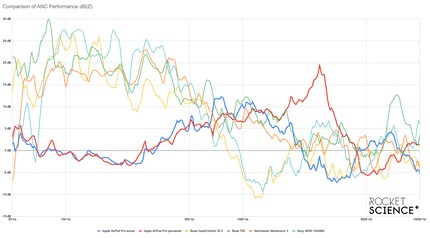
After half an hour of back and forth and numerous questions to Philippe Niquille and Manuel Isenegger, I finally understand what the article is getting at. The thesis of the acousticians:
A quick note on psychoacoustics: This discipline of sound research does not focus on actual physical measurements, but on the subjective perception of different test subjects. Once this has been clarified, we let Manuel and Philippe show us the test setup with which the headphones were tested. This is not located in a highly sensitive measuring chamber, but is part of the office, as it is a much better reflection of reality
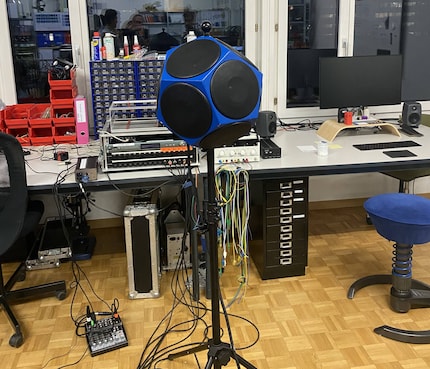
Omnidirectional speaker box that plays Pink Noise.
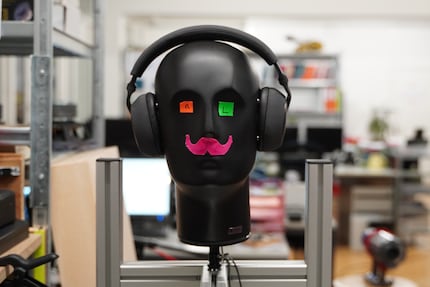
The artificial head is modelled on the mass and anatomy of a human skull. Highly sensitive microphones are installed inside
.
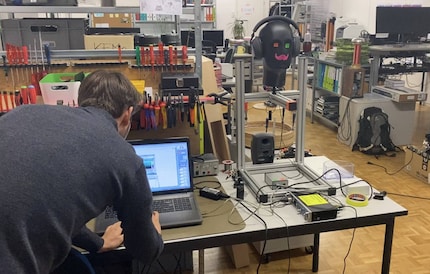
The sounds recorded by the artificial head are visualised in real time on a notebook.
Of course, Livia and I want to try this out. Livia has taken a Bowers & Wilkins PX7 with her so that the experts from Rocket Science can measure it. Livia wants to know how it performs against the Bang & Olufsen H9 3rd Gen.
The short test shows that at first glance, the B&O delivers better noise cancelling than the competitor from Bowers & Wilkins. Livia is amazed because she thinks the PX7 is better. "That could be a good thing," explains Manuel. "Noise cancelling is not that easy. The headphones from Bang & Olufsen filter out more low frequencies, but the high frequencies stand out all the more." If you look at the raw measurements, the product from B&O is better. Psychoacoustically, however, a product that filters less well but more evenly is perceived as better.
The noise-cancelling thing is trickier than expected. And measurement diagrams don't tell the whole truth.
Another problem with Philippe's article on medium.com is that it pits a single in-ear headphone, the AirPods Pro, against over-ears. Although both classes of devices have different problems to overcome in the task: The over-ear has the advantage that the headphone cup already provides good attenuation. The in-ear has the advantage of being deeper in the ear canal.
"The deeper the headphones are in the ear, the easier the task is," explains Manuel. So we asked Rocket Science for a direct comparison between the new AirPods Pro and another in-ear with noise cancelling. Livia chooses the Sony WF-1000XM3 as the challenger and leaves a pair to the audio nerds.
A few days later, Philippe sends us an updated chart comparing the noise-cancelling performance of the two in-ears.
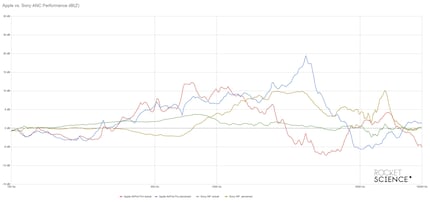
It doesn't look good for Sony: "Our verdict on the Sony ANC: bad," writes Philippe. Although the Sonys deliver roughly the same decibel reductions as the AirPods Pro, they have a different frequency focus.
The transparency mode of the Sony in-ears is also "in our view, far less finely tuned than Apple's", Philippe continues. The WF-1000XM3 reproduce disturbing high frequencies in particular. The alternating effect - i.e. the difference between transparency mode and ANC - is also far less impressive with Sony compared to Apple. This big difference doesn't make the AirPods Pro any better - but it does make them seem better to the ears.
I already realised before the test that the AirPods Pro had no chance against full-blown over-ears with noise cancelling, such as the QC 35 II from Bose. I own the AirPods Pro myself and still think they are extremely good. I am particularly impressed by the convenience of the Apple in-ears. With all the nuances of the English word: comfort, convenience, practicality, user-friendliness, simplicity.
The test by Rocket Science confirms that the AirPods Pro are a carefully crafted product that Apple has spent a long time refining. The noise cancelling is not top class, but it is well implemented. However, I now have it in black and white, which is why I prefer to wear an over-ear in really noisy environments.
I'm the master tamer at the flea circus that is the editorial team, a nine-to-five writer and 24/7 dad. Technology, computers and hi-fi make me tick. On top of that, I’m a rain-or-shine cyclist and generally in a good mood.
Interesting facts about products, behind-the-scenes looks at manufacturers and deep-dives on interesting people.
Show all